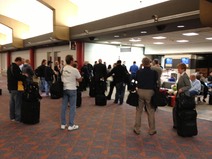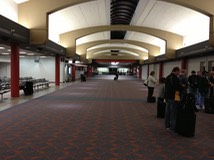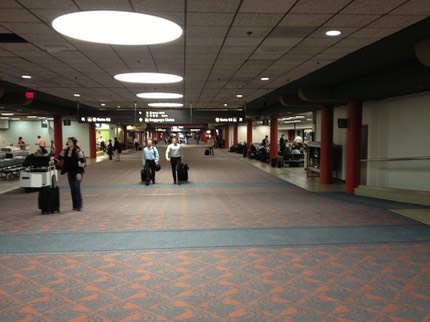This week marks the 20th anniversary of the opening of the Midfield terminal at Pittsburgh International Airport.
 |
| photo: Scott Hanley |
 |
| Photo: Scott Hanley |
The Pittsburgh Post-Gazette has a very good retrospective on the "new" airport - and how the world changed in less than a decade to make for a decidedly less ambitious current state.
The "new" Pittsburgh International was unique in its time - I liked to call it the most secure shopping mall in America, since, before "9/11," anyone could come in and peruse the scores of shopping mall-type stores at the AirMall. I recall buying my first sound card for a computer at PIT while on a visit with my sons.
The walk to make connections was far easier than most airports. The baggage claim system was "state of the art," though that art had a way of not always living up the promise...
 |
| Greater Pittsburgh International Airport, 1950's |
I remember flying into the old Pittsburgh airport long before I ever thought I might live in Pittsburgh. It was a grand old place in its own way.

NPR VISITS
In January 2001, NPR's All Things Considered sent an entire production team to Pittsburgh International to follow what went on in the course of the 24 hour workdays at what was still, then, a very busy airport.
Airplanes at Pittsburgh International Airport
(Photo: Ellen Weiss)
This NPR project was more than a dozen years ago. It is interesting to hear how much like every other airport operation PIT was back then. It is a transit hub, so there are things that have to be done. People working at 3 in the morning face many common issues, so this was a good, generalized set of stories.
Still active but not so busy
 Pittsburgh still has a fairly busy airport for a community of its size. It just isn't as busy as what planners had expected. PIT appears to now be serving fewer travelers than Cleveland-Hopkins International.
Pittsburgh still has a fairly busy airport for a community of its size. It just isn't as busy as what planners had expected. PIT appears to now be serving fewer travelers than Cleveland-Hopkins International. The evolution over time of Detroit Metro Airport is a good indication of what a difference the travel needs of 4 to 5 million people can do for business as opposed to a market of 1 or 2 million. With more international travel and a larger base population to originate flights from, Detroit Metro continues on a pattern of increased passenger visits.
I remember coming to the "new" Pittsburgh International not just to make a connection but for business. But it took very sad turn with the crash of USAir flight 427 taking 132 lives in September 1994. This was less than two years after the opening of the new terminal. This was also not long after the Pittsburgh newspaper strike of 1992-93, which changed the landscape of media in that city.
The media coverage of crash of flight 427 was a bellwether event for a city ready to head into yet another era of change. The much investigated accident led to changes in how all Boeing 737's would be maintained, too.
The downturn in USAirways activity, the reduced air travel from several recessions and the very nature of being in a smaller city meant that whatever USAir would or would not do in Pittsburgh would have stronger impacts on the airport than one would see in a much larger market.
I now live in Birmingham, AL, where the Birmingham-Shuttlesworth International Airport is the largest in the state and sees about half the traffic of PIT.
Which brings me to a topic I hadn't thought of at all when I first contemplated writing this post. As of this week, the Birmingham News is changing, too, cutting back print editions from 7 days a week to three, and renaming the enterprise the Alabama Media group.
My station, WBHM, and our Junior Advisors Board is holding an "Issues and Ales" event this week, bringing together media experts of different backgrounds to discuss what is next in the realm of information and journalism in transition.
Thursday, Oct. 4 from 6 to 8 p.m. at Cantina at Pepper Place in Birmingham, AL.
Hope to see you there - as we get started on the future.
John Lennon wrote, "Life is what happens while you're busy making other plans," and I tend to agree. But if you are paying attention and choose to act, perhaps you can have a role in whatever comes next.
But fasten your seat belts, put your tray in the appropriate position, and be mindful of the exits!




















